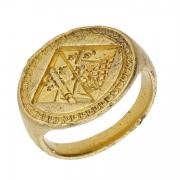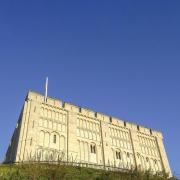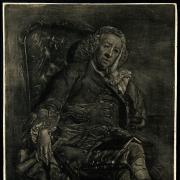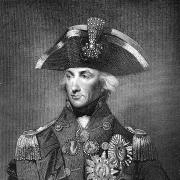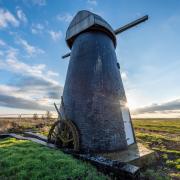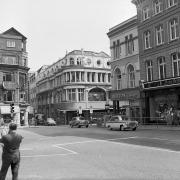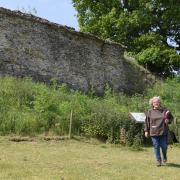As a boy in the 1950s I found it difficult to decide who it was I most admired - it was a close-run thing between cricketer Bill Edrich and astronaut Dan Dare of the Eagle. But one other, fictional, character always ran both Edrich and Dan Dare close - Major James Bigglesworth MC and Bar, DSO.
Biggles was the creation of Capt. W E Johns, a writer who worked at an incredible rate – in the 1930s he averaged five books a year while editing two magazines and contributing to two more. A natural and gifted storyteller, he occasionally embellished accounts of his own story too, writing under the title ‘Captain’, a rank he never attained. In the RFC he was a lieutenant.
Johns (and Biggles) had strong Norfolk connections. Biggles spent his school holidays here with an uncle (his parents were in India) and learned to fly at the fictional ‘Settling’ airfield in the same county. As for Johns, his first job was in Swaffham, he married the daughter of a Norfolk parson, and enlisted in the Norfolk Yeomanry as a private in 1913, later transferring to the Royal Flying Corps, becoming an instructor at Narborough.
Johns always wanted a military career, but his father arranged for him to be articled instead to a municipal surveyor. His articles finished, in 1912 his first appointment was as a sanitary inspector with Swaffham RDC, an unlikely start to an extraordinary career.
A talented musician, Johns attended a concert in Swaffham and was taken with some pretty girls in the audience. Discovering they were the daughters of a local parson, the Rev Hunt, vicar of Little Dunham, he wasted no time, attending evensong the following Sunday.
Clearly, he was a man of some charm because, introducing himself to the Vicar at the end of the service, he was invited to join the family for supper. He became attracted to the eldest daughter, Maude - they married in October 1914.
The following year Johns was posted, briefly, to Gallipoli, leaving Maude expecting their child. After another posting to Greece, where he contracted malaria, he applied for a transfer to the RFC, receiving a temporary commission, and learned to fly.

His first solo flight lasted less than a minute - stalling and crashing as soon as he had taken off. Crashes were frequent in those days, but Johns became something of a specialist. Apart from shooting off his own propeller, twice, he had numerous other mishaps.
He told of having landed safely when his engine cut out at the far end of the field. To taxi back to the hangars, he decided to re-start by setting the throttle controls, climbing down and swinging the propeller. Nothing happened so he adjusted the throttle setting and swung again.
This time the engine fired and the plane taxied off before he could re-board, only to collide with another plane. Given his propensity to reduce aircraft to a heap of scrap it seems bizarre that he should have become an instructor but was posted as such first to Thetford and Narborough, then to Yorkshire creating an early impression there by making three forced landings in three different aircraft on three consecutive days.
Posted to France, he flew a number of bombing missions in a De Havilland DH4 – nicknamed ‘The Flaming Coffin’. His luck soon ran out and, after just six hours of operational flying, he was posted missing.
Pursued by German fighters, wounded, with his observer/gunner dead, and with fuel leaking into the cockpit, Johns managed to land his crippled aircraft in a ploughed field behind enemy lines - his first experience of captivity was being punched in the face by a German NCO enraged at a recent bombing attack which had killed local children attending Sunday School.

Recounting his experience of this mission Johns couldn’t resist a little embellishment. He maintained that he had been bested by a top German ace, Ernst Udet, telling how Udet had followed him down, landed by his crashed plane and arranged medical attention for him. In fact, Udet was away on leave at the time. Nonetheless he told the story well enough for it to be accepted at the time and it was repeated in his obituary.
His imprisonment was not without incident – he made two escape attempts. The first, as he told it, was simply to climb out of the window of the lavatory in his hut, and look for an aircraft to steal to fly home. According to the well-built Johns all went well until his hips got stuck in the window frame - he had to be pulled back into the hut by a fellow escapee. His other attempt was more successful and he was free for a few days.
Freed after the Armistice he returned to Little Dunham on Christmas Day 1918, delighting the family who had believed him dead. A celebratory firework display arranged by his father-in-law suggested that his propensity for accidents was catching - the entire display went up at once, ignited by a stray spark.
Coming home Johns, like many others, found it hard to settle, not wanting to return to sanitary inspecting when he was demobbed. Life at Little Dunham wasn’t exciting and his relationship with Maude was deteriorating.
He grasped the opportunity to re-join the RAF when it was offered though the role was non-operational, involving the interviewing of potential recruits, an occupation he found boring.
It was clear by now that his marriage was over and Maude moved with their son Jack to her family home, refusing Johns’ request for a divorce. Recruiting in Birmingham, Johns met the girl with whom he was to spend the rest of his life, Doris Leigh.
Denied the chance of marriage they set up home together first in Newcastle and later in London. He made himself responsible for the maintenance of both Maude and Jack and the financial pressures must have been considerable, especially when he reached the end of his short service commission in 1927.
Needing an alternative occupation he became an illustrator of aviation scenes in various books and magazines but soon turned his hand to writing, mainly factual pieces about aviation for various magazines. Flying was still new and exciting and his work proved increasingly popular.
Soon he was approached to take the editorship of a new magazine, Popular Flying, which became an instant success, and Johns created the character of Biggles in a series of short stories for the young adult audience it targeted.
He also wrote stories for younger readers of The Modern Boy, having to bowdlerise the stories, replacing spirits with lemonade, removing any bad language and eschewing any relationships for Biggles with the opposite sex. It is a sign of Johns’ genius that he was able to write fiction so convincingly about the macho world of early aviation without any such references. Such was the popularity of his stories for boys that he began to write Biggles stories exclusively for this market.

By now, Johns and Doris were comfortably off but the 1930s wasn’t a happy decade, and Johns was concerned by a re-arming Germany. Believing it essential for peace that Britain should respond, his editorials became increasingly critical of government policy.
In early 1939 he was dismissed from the editorship of both Popular Flying and another magazine, without public explanation; his dismissal was widely attributed to Government pressure on the publishers to rid them of a ‘turbulent priest’.
Soon, his warnings were vindicated by the outbreak of war. Now in his mid-forties he became a charismatic lecturer for the Air Training Corps, for whose members his books were a popular choice. These duties and others such as ARP work barely diminished his literary output, now extended to include writing scripts for a wireless programme.
An invitation to take a fishing holiday in Scotland persuaded him to move there in 1944. Having rented a substantial property Johns enjoyed a more relaxed life, shooting and fishing between bursts of writing. The war over, Johns remained in Scotland until 1953, when he returned south, by then wealthy enough to purchase a mansion near Hampton Court.
Soon he had to come to terms with the death of his son at the age of just 38. His relationship with Doris lasted more than 40 happy years but, even after Maude’s death, they never married possibly because in those less press-intrusive days everyone thought they already were - Doris had been known as Mrs Johns throughout those years.
Johns was still writing a Biggles story on the day he died, in 1968, at the age of 75. Doris died a year later.
W E (Bill) Johns was someone to whom things happened. Accident-prone though he may have been as a pilot, he was a man of considerable courage and determination. He was also a fundamentally decent man - he continued to support his wife and child for the rest of their lives.

He was musical - in his early days he was a cinema pianist - and a talented artist but above all he had a gift for writing in a style which thrilled generations of youngsters. His output was astonishing - over 160 books and many articles.
By the time of his death his work had been criticised as racist, chauvinist, violent and tending to glorify war. Some libraries even banned his work. But to those familiar with his books such criticisms seem shallow and based on the thinnest of evidence. One thing the critics seem to have failed to do is to consider his work in the context of the times during which it was written.
We tend gently to poke fun at those we admire and Johns was ‘fair game’. One paper ran an exclusive story that Biggles really had existed, backed by a detailed analysis of his career.
The article was published on April 1st! He was also the butt of some gentle parody by the Monty Python team –‘Biggles Flies Undone’ and ‘Biggles meets Bruce Springsteen’ are examples, but what Johns had in spades was imagination.
While this may have led him sometimes to embellish some of his own exploits it is an aspect of his character for which children of my generation and several others have every reason to feel grateful. It was that imagination which, combined with some extraordinary experiences and a huge talent for telling a yarn, brought so much pleasure to so many of us.




